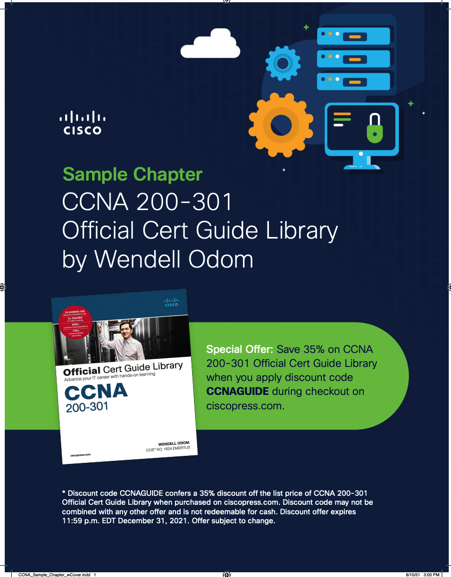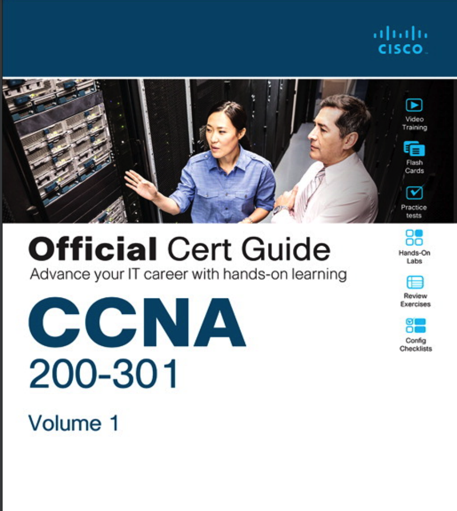Exclusive Courses | Cisco CCNA 200-301 IP Address Tutorial
Classes of IP addresses - Study CCNA
- Experienced instructors with industry expertise
- Access to official guides and materials
- Covers all exam topics thoroughly
- Flexible study at your own pace
- Support for exam service
- Anytime access to study resources
What you'll learn
Training Course Outline
CCNA CCNA 200-301 IP Address
1. IPv4 Addressing (Part 1)
2. IPv4 Addressing (Part 2)
3. Configuring IP Addresses
4. Switch Interfaces
5. Configuring Interfaces
6. IPv4 Header
7. The Life of a Packet
8. Life of a Packet
9. Subnetting (Part 1)
10. Subnetting (Part 2)
11. Subnetting (Part 3 - VLSM)
12. Subnetting (VLSM)
13.IPv4 and IPv6 Subnetting: Zero to Hero
14. IPv6 Part 1
15. Configuring IPv6 (Part 1)
16. IPv6 Part 2
17. Configuring IPv6 (Part 2)
18. IPv6 Part 3
19. Configuring IPv6 (Part 3)
Training Options
Self Paced Learning
- Lifelong access to high-quality content
- Curated by industry experts
- Customized learning progress
- 24/7 learner assistance and support
- Follow the latest technology trends
Exam Dump
- 100% Real Exam Practice Tests
- 100% Verified Exam Questions & Answers
- 100% Guarantee Passing Rate
- Average 7 Days to Practice & Pass
Description
The CCNA 200-301 prep course provides hands-on training with core topics of IP Address. Level up your career in IT with this video-based online training course designed to help you master foundational networking knowledge-IP Address and succeed on the CCNA 200-301 exam.
Pre-requisites
No requirements.

CCNA 200-301 Official Cert Guide
When preparing for your certification exam, use the CCNA 200-301 Official Cert Guide Library—the only self-study resource approved by Cisco.

CCNA 200-301 Official Cert Guide Library
CCNA 200-301 Official Cert Guide Library is a comprehensive review and practice package for the latest CCNA exam and is the only self-study resource approved by Cisco.
Cisco CCNA 200‑301 Courses FAQs
What is Cisco CCNA 200‑301 IP Addressing?
Within the context of the CCNA 200‑301 exam, IP addressing refers to the process of assigning unique numerical identifiers to devices in a network. This topic covers the fundamentals of both IPv4 and IPv6, including how addresses are structured, how subnetting divides networks into manageable segments, and the differences between public and private addressing. Mastery of IP addressing is critical for designing and troubleshooting networks effectively.
How is IP addressing integrated into the CCNA 200‑301 curriculum?
IP addressing is a cornerstone of the CCNA exam syllabus. Candidates are expected to understand how to configure IP addresses on various network devices, plan and implement addressing schemes, and perform subnetting calculations. The curriculum emphasizes real-world applications—ensuring that you can identify and resolve addressing issues in both small-scale and enterprise networks.
What is the structure of the Cisco CCNA 200‑301 exam?
The CCNA 200‑301 exam is designed to evaluate both your theoretical knowledge and practical skills. It features a mix of question types, including multiple-choice queries, drag‑and‑drop activities, and simulation-based scenarios. This variety of question formats tests your ability to apply concepts in realistic network situations, and the exam typically spans around 120 minutes.
What types of questions can I expect regarding IP addressing on the exam?
Questions on IP addressing in the CCNA exam often require you to demonstrate proficiency in configuring and troubleshooting IP setups. You might be asked to perform subnetting calculations, differentiate between IPv4 and IPv6 addressing schemes, and apply concepts such as DHCP and IP address management in simulated network environments. These questions are crafted to ensure you can deploy effective IP addressing solutions in practice.